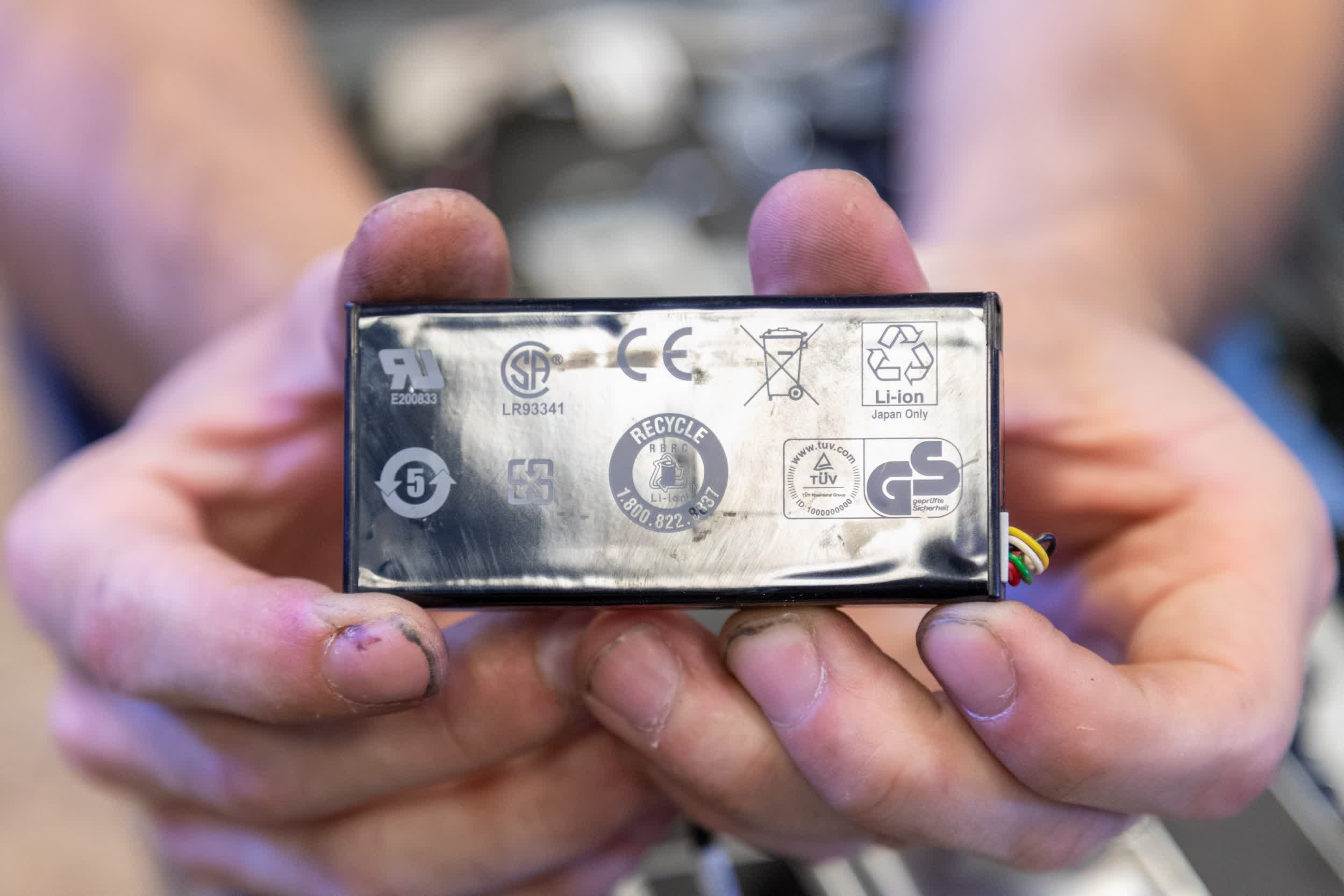European Union is doing the work the U.S. government should be.
U.S. government is too busy worrying about what people are doing in their bedrooms, libraries and doctor’s offices.Meanwhile, one of the US parties is trying to ban universal free school meals. Sad.
We don’t get free school meals in all European countries though. It’s fairly inexpensive where I live and people with low income do get it free but it’s not universal.
Not all countries have the same school hours. In some places, the expectation is that kids get out of school by lunch time.
Also, school meals are not the first line of defense when it comes to food insecurity, like it’s unfortunately often the case in the United States.
Beyond being good for right-to-repair, this used to be the one way to be sure that your phone is off and is not listening to you. It’s a stride on the privacy side as well.
Great news! No point in 5 or 6 years of software updates when the battery gives out after 3 years.
I’ve replaced some “non replaceable” batteries in phones before… Only to find that after about 5 years of medium use the flash storage goes to shit (which causes massive slow downs), the chips begin to desolder themselves, the USB port gets janky and stops charging, etc.
Batteries are a great first step, but damn these $1000+ devices just are not built to last more than 3 years
Honestly, they are pretty damn stressed devices though.
If you think about it, they are on 24/7, with active usage at least 4-6 hours a day, exposed to god knows what humidity, unknown low and high temps, dropped every x days. It’s a modern technological miracle that they last as long as they do. Lots of read and writes with photo and video backups.
My 5 year old X died a month back (flash memory failed), I was actually impressed that it lasted that long.
Very true. Amazing technology we take for granted
Yes I’m thinking next time around to go for a good mid-range. Considering the time that phones actually last, it’s too much to pay for flagship phones.
Not too mention what even is the point of getting a flagship?
The cameras are great on most phones, the specs are good enough for most people’s use case (call, text, social media).
Hell the last few years the consistently best rated phone camera by users has been the Pixel A series of phones. The budget Pixel phones.
The only reason I got my flagship Sony Xperia is because it still had a headphone jack, sd slot, and no notch. It was expensive but everything I wanted. Last phone was an iPhone 6s. I wish there was cheaper options honestly for what I’m looking for but those 3 combinations don’t seem to exist other than Sony.
I feel you on that
I miss the days of sd slots, headphone jacks, and removable batteries.
Phone cameras are pretty good now though and the Xperia has a damn good one
Yeah, that’s the problem with these things: they’re wasting assets. If you want maximum longevity on your phone, not only do you need replaceable batteries but to purchase the absolute maximum storage so you can benefit from wear leveling on the flash. And even then, it will still slowly degrade over time.
Google tried to build a modular phone and ended up cancelling the project in part because these systems are essentially an SOC surrounded by support hardware. Still, I’d buy a modular phone or at least one that allowed swappable batteries because Android phones are still a beast on battery thanks to all the background services and large, power hungry screens.
Which makes sense since they were expecting the batteries to poop out earlier
Yes! mandatory usb C and replaceable battery, and i’d like the 3mm headphonr jack to also be a standard 😁
Me too, but that one might be dead for good.
Out of the phone vendor fuckery with the connector, battery, micro SD, and headphone 3.5mm, the headphones were always the biggest thing.
Bring it back please EU hear my prayers. Right now I’m listening to music on my iPhone with a half broken dongle that pauses if I jiggle it wrong.
The fucking audacity to remove a quintessential port is typical Apple. Was the same with DVDs, Ethernet, now even USB. Next thing I know there’ll be no more ports, you’ll have to wirelessly (and inefficiently) charge your phone even if you like it or not
Not for any technical reason afaik. My LG G7 is plenty modern and has a 3.5mm jack. It also has Bluetooth, so it’s not like it’s an either/or choice. It’s just the manufacturers dictating what choices consumers have.
No, it’s easy as shit to smack a little audio DAC in there. It probably means your phone has to be at least as thick as the whole port, but so what? It’s a fashion statement to move to pure wireless really.
I don’t hear about it so much anymore, though, so it seems it was accepted.
The EU has been good at holding phone manufacturers to account on this kind of thing, glad it’s gone through. I’ve had at least two phones die on me through the battery breaking, it shouldn’t be cheaper to just buy a new phone than get the battery replaced. So much waste.
Hoping us UK folk will see the benefit of this as I imagine it’s less effort to just bring the change about across the board than to be specific about geography.
deleted by creator
To add to this, iirc Labour said their policy would be to closely mirror EU regulation in most areas unless there was a good reason not to
I don’t mind that my phone battery is sealed up. I do mind that I have to bring it to a specialist that might screw it up and make me pay for the privilege.
Actually, this bothers me way more with laptops than with phones. With laptops, there’s no water resistance or any other reason besides thinness to seal the battery up. Particularly with business machines, the computing power will be more-than-sufficient for many years to come, yet many will end up in the trash because the battery’s no longer doing its job. It’s ridiculously wasteful.
@MrTHXcertified I think that no device should be built in a way that it cannot be disassembled anymore. Concerning the argument “but what about water resistance?”: remember that for a long time there are quartz watches that are water resistant to incredible depths - and their batteries can be replaced.
Yep, we need universal right to repair/ease of repair regulations to stem all the electronic waste.
Many laptops/ultrabooks have easily accessible batteries nowadays, any specific example when you mean sealed up?
All of them. You could argue that the time and expertise needed to replace a laptop battery is negligible, but I say it’s an unnecessary increase of time and risk required to do so.
What do you feel are the benefits of embedding a laptop battery in the case?
What do you feel are the benefits of embedding a laptop battery in the case?
Portability for one. You can move your laptop without worrying about the battery latches getting damaged.
I used to refurb laptops and I’ve seen plenty of externally mounted batteries that just wouldn’t reliably sit on the laptop anymore.
Aren’t business laptops usually really easy to open up and repair? I hope that hasn’t changed…
This is a big part of why I bought a Framework laptop. Every part is easily accessible and they sell replacement parts. The laptops are even modular and upgradable
I remember when I was looking for a new laptop, I made a replaceable battery a requirement, since my previous laptop’s battery (which wasn’t replaceable) lost its charge very fast.
Out of the hundreds of laptops available today, I could only find two or three laptop models total with a replaceable battery. And none of them were in physical stores, so a less tech-minded person would never find them.
Interestingly, the replaceable battery also seems to be higher quality than the permanent battery was.
I got one of the framework laptop over a year ago and it’s been fantastic other than having a defective trackpad (which took all of 10 minutes to replace after receiving a free replacement part from their support team). I will even be able to upgrade to a newer mainboard with an AMD CPU from the current 11th gen intel later this year when the boards start shipping.
It really grinds my gears when companies claim that repairable devices aren’t possible to make in modern form factors, especially when a rinky dink startup was able to do it.
Out of the hundreds of laptops available today, I could only find two or three laptop models total with a replaceable battery.
Nearly every business class laptop has a replaceable battery, you just need a philips-head screwdriver for most.
Anything that is meant for consumers shouldn’t be bought anyway, Dell Inspirons and HP Pavilions and shit are not made to last unfortunately. Nor are they made to be easily repairable. I’d go as far as recommend an 8 year old thinkpad over some brand new consumer models. It’ll last longer.
Good, now add SD card please.
And headphone jacks
These days I don’t buy a phone if they don’t have a micro SD slot. Need that extra space without paying a bullshit upcharge for the larger model phone
tbh SD cards are out and mostly for power users, make them compatible with M2 drives :))
Screw M.2, I want to use my enterprise grade 7TB U.2 Kioxia drive in my 50 bucks Chinese phone, I just can’t live without it!
SD cards and M.2 drives are not really comparable, since they are used for different things. It would be cool to have a phone that has main storage a M.2 drive, but i would still want it to have an SD card slot.
M.2 would make phones inordinately thick and un-usable. If you really need more than 1TB of storage on your phone, dump your pictures and Videos every so often to a home NAS PC running TrueNAS Core or Scale. And if you have Music on your phone that you own the files to, consider using your home NAS as a Media Server using Plex and use Plex Amp or some other app to stream the music direct to your phone.
I don’t even want to replace my battery. I want it to last. At least 5 years.
Bring legislation that enforces a 5 year warranty on batteries that are built-in. That would help the environment much more than being able to replace a battery every year that shouldn’t fail in the first place. And yes, it’s possible to build batteries that last longer. It’s more effort, true. But so is building exchangeable batteries or doing an exchange. I rather shell off 50 € more for my phone when I know that the battery will make it 5 years.
I want it to last. At least 5 years.
That is something that would be very hard to legislate. Especially since battery lifetime is dependent on a variety of external factors (charging-style, temperature of the device, luck). Build quality certainly also factors in, but even the best battery won’t survive a 10 year old regularly overheating their phones with games and charges it for the entire night. I would love to see OEMs implement nice things like “capacity settings”, where you can set your device to stop charging at 80% and show it as 100%.
This is exactly what happens in cars. Usually, you have an 8 year warranty for your battery.
Yes, a phone is smaller. Less space and weight. But 5 years are less as well. The electronics can track everything, shut the phone down if it’s too hot (and not when it’s so hot that it’s in danger to burst into flames like it is now). Adjust the charging speed by temperature. Do not charge the battery to 100 %. …
All things the manufacturer can influence.
These are all things that most phones already do, though. I think a realistic expectation of battery lifetime is needed here. Better allow for easier replacement in my opinion, the batteries themselves are not expensive (though we don’t want to generate unnecessary waste, so, of course we try to make them last as long as feasible)
No, they don’t.
The switch off far too late. The battery is built for weight and size, not for durability. The do not keep a margin to preserve battery life and charge way too high and too low.
Replacing batteries is the wrong approach, because it wastes resources we don’t need to waste.
I’m firmly convinced that 5 years battery life is achievable, if we just force the companies to do it. It’s just cheaper for them not to do it right now. And companies always do what is cheapest.
And worse: This legislation will actually cement the battery degradation, because the companies have even less reason to build batteries that last. “Just replace them!” will be the answer if it’s dead after 6 months.
Do you have a citation on that 5 years being achievable now (or soonish)? I am not very knowledgeable on the state of battery manufacture and from my thinking the constraints we have to work with in phones are mostly volume. In a car you can just “add more battery” as a buffer, but in a phone that space just isnt there.
TL;DR: is there research on this kind of battery lifetime without major limits when it comes to capacity?
On a Phone, people are already conditioned to have their phone work all the time, no matter what you do to it, and there is an advertised Maximum Battery Capacity.
People don’t do the 80/20 rule on Phones because that’s outrageous to them.
But EV Manufacturers have built in the 80/20 rule into their cars. When you do long distance EV trips, the Route Planner will automatically tell you where the next charger that you will arrive at 20%-ish battery capacity will be and route you there. And the car will stop charging itself at 80% and you’ll be ready to go.
Phones on the other hand, tell you “Hey moron, I’m at 30% you should charge me!” And most phones don’t have a Battery Protection setting to cut charging at 80% (Samsung added this about a year ago to their phones)
If you shouldn’t charge over 80%, why don’t manufacturers just report a battery at 80% its “real” capacity as 100% charged? Same for the lower margins. It would probably make things easier for people to understand.
They would probably have to switch to LiFePO4 batteries to get 5 years reliably. That would increase the thickness of the phone quiet a bit if you want the same capacity.
Lipo batteries are not capable of being cycled daily for 5 years, even under ideal conditions.
It would be nice to have it covered in a phone warranty or something. Would like to also see legislation requiring software updates for 5 years, is kind of silly how fast devices are considered obsolete by their manufacturers. Even Microsoft supports Windows versions for like 10 years.
This is what sucked me into the Apple ecosystem in the first place. The first couple of Android devices I had were paperweights within 2-3 years. Shifting to Apple, I’ve yet to have a device last less than six years.
Laughing in Fairphone
Same! But the beauty of it is that this effectively creates a competitive advantage for Fairphone. Fairphone is already compliant, while all other smartphone companies will have to develop this from ~scratch.
oh thats so good that will force other phone manufacturers to stick to competitive pricing…
Still bummed they wont bring these to the USA
You can import it! I got one in Canada using a site called Clove Technology
Did not know about this, thanks
Doesn’t work on US networks IIRC.
Depends on where you live and what service provider you use. There is quite a bit of overlap between European and American cell frequencies, but it’s not something you can just assume will work.
The main problem with Fairphone is… It won’t come to the US. However, I am very happy that this will affect Apple, because I am making the switch from Android to iOS. I know that Apple won’t be stupid enough to have two separate plants, one to make EU Compatible phones, and one to make Global phones.
The costs for such a thing would be inordinately high even for Apple.
It’ll be interesting to see what Apple does, between this and the USB-C mandate.
Considering they currently sell multiple phone form factors, they may just decide that the EU gets more expensive phones with removable batteries and USB-C, and the rest of the world continues to get what they’ve got.
Also, I’ll be interested to see how “removable” gets defined. I’ve replaced iPhone batteries, so they’re technically removable.
Or, Apple might claim that their MagSafe battery packs make them compliant.
Nah, the main problem of the FairPhone is it’s water resistance. Which is the lowest of low. Not quite sustainable in that regard: youre always one wet pocket away from disaster.
It’s unfortunate that Fairphone sucks in other ways (such as having limited firmware updates due to using an old SoC, as I understand it).
And the headphone jack. Et tu Fairphone
Back in the day I used to just keep 2-3 fully charged spare batteries if I went out. No need for a battery pack to recharge if I can just quickly swap battery and get a days worth of charge instantly.
I used to keep 2 extras as well back in the day when using the phone for an hour straight would kill it and I was on the go. I agree that batteries should be more easily replaced and the current design philosophy of hidden screws hidden behind a glued together screen is crazy .
That said I think power banks are better. They store better they are universal so you can use them with different phones and devices and thanks to that theres less e-waste. They take longer to charge but if you know you need it you can just plug in before you get too low so you dont have to be plugged in to long.
Agreed that power banks are better for those uses, but it’s also about what you do when the internal battery has degraded.
I don’t really see the benefit anymore. My current device lasts ~40 hours on a charge, so I seldom find the need to swap anything out. Even if I did, those little USB battery packs that charge multiple devices are more practical. On a long flight, my wife and I just share one and it works on the Switch and tablet too.
Sealed devices have way better water resistance, less plastic makes the batteries themselves bigger, and wireless charging (especially with magnets) will be challenging to add to a battery that’s also the back cover.
I’m sure I’ll be in the minority on this, but, I don’t really have any interest in a removable battery, especially if it involves other compromises on size, capacity, and features.
I see it as a longevity thing.
Sure you can bring another battery pack with you and charge your device from it, but at some point your internal battery will be degraded enough that it essentially needs to be plugged in to function, which is not feasible.
Being able to easily replace the thing in the device that wears out fastest is a good thing.
Granted I expect if this does go through, that mfg will make the battery hard to replace by other means (ie drm locks) making sure they can nickel and dime the consumer all the way.
Being able to easily replace the thing in the device that wears out fastest is a good thing.
Yeah, it’s like buying a car without being able to change the tyres.
The maximum a phone will ever last is probably ~10 years, because that’s about how often 2g, 3g, lasted. By then it certainly isn’t getting any software updates and on the Android side, security updates won’t even last 5.
So the maximum lifespan of a phone is, reasonably, 5 years. That’s taking into account software updates, and other wear and tear.
During that time, if you use and abuse the battery, you might go through 2 batteries, which you can have serviced.
So I’d say it’s more akin to a timing chain that’s a pain in the ass to replace. Most car owners would not try to replace a timing belt, much less a timing chain.
I’d say that it’s tough to make a definitive statement on the maximum lifespan of phones.
For one, Fairphone is selling phones with 5 year warranties, so I don’t think there’s any argument that a phone with a replaceable battery and continuous updates shouldn’t last at least 5 years.
With regard to cellular technologies, I think it’s hard to compare the technologies of the 2000’s with the technologies of the 2010’s and 2020’s. Smartphones radically changed the purpose of cell networks, which meant there was a rapid shift in technologies in the 2000’s.
That said, 2G networks like GSM and GPRS are still around and are only set to be shut off in some countries around 2025. GSM is from 1991, and GPRS was standardized in 2000, but the protocol existed as early as 1993. That’s 20-35 years that you could use your old StarTac or RAZR, though, those are not smartphones.
3G didn’t last as long as 2G did, as it was more of an overclocked 2G developed as a bandaid to keep up with smartphones, as opposed to the packet-switched network that we have now with 4G and 5G.
Looking at the most recent technologies, LTE and Evolved Packet Core are still the backbone of our cellular networks, new wireless standards like 5G NR just piggy-back off of existing 4G networks. LTE has been commercially available since 2010, so again, that’s over 13 years of radio/network compatiblility, with likely another decade to go.
Considering how much smartphones have matured in the last 10 years, and how the pace of releases have slowed down, I don’t think it’s unreasonable for the average smartphone to last 10 years like laptops do. It just requires better compatibility and maintenance on the software front, which Google has already been improving on for the past 5 years.
Over here 3G got completely shut down and frequencies reused for 5G. Most bandwidth seems to be allocated to 4G, 2G is, as far as I can tell, bound to stay: It’s legally mandated to be available for emergency calls and is plenty for dumb phones.
You can certainly make the argument that phones (and computers) are slowing down. It used to be a revolution every year or two, now it’s very incremental.
I would not say though that you can effectively use a 10 year old phone. There are some old networks out there, but major networks shut down 3g.
You might have seen Joanna Stern’s attempt to use an iPhone 3G on YouTube last year (if not watch it for some amusement). Even if the battery on that device were fine, the device was really pretty unusable.
Also: even if the battery were easily replaceable, replacements will only be easy to find for the most popular older phones.
Yeah, I’m not saying that people should be using a Nexus 5 (a 4g phone) in 2023. Smartphones have matured a lot since 2013 though, and I think phones coming out now will still be perfectly usable in 2033, as long as replacement parts are available and they are updated to 2033 software. There are people using x230 Thinkpads in 2023, so it’s definitely possible with laptops.
I’ll have to check out that video, it sounds pretty interesting!
Yeah, Thinkpads are still usable, though I don’t think most people would want to run an x230 today. It might be usable on Linux with XFCE. But Windows? Eh…
Either way, what’s stopping phones from lasting longer isn’t really batteries. You could take a phone in for a replacement battery every 2 years and it would still be unusable before too long because of software updates.
I do think requiring OEMs to provide security and software updates for at least 5 years would be a sensible regulation. Maybe even 10 years for devices over $1000.
I agree. I’ve has to scrap and force upgrade multiple devices over the years, solely due to the battery dying quickly. Definitely a built in obsolescence built into the industry that needs to be fixed.
Definitely a built in obsolescence built into the industry that needs to be fixed.
This is why I’m a fan of the right to repair and wish more jurisdictions would enact laws around it. If the EU ends up having stricter regulations than the rest of the world, it’s possible manufacturers will just end up having totally different models in EU vs elsewhere.
As long as they’re reasonably replaceable, I don’t see it as a big issue for longevity. I’d rather have a bigger battery (less plastic casing), wireless charging w/ magsafe, better water resistance, etc.
If the battery is toast 3 years in, I can just replace it, which I’ve done on other devices (including my last Pixel). It’s not much more inconvenient than taking a car in for an oil change. Besides, on my 18 month old phone, capacity is at 95%. These days batteries often last as long as you’ll need them.
I see the much bigger longevity issue on the software side. Many phones (especially budget ones) only get 1 major OS upgrade and very infrequent security upgrades.
You mentioned MagSafe, so I assume you use an iPhone. I have an iPhone 12 mini and the battery life is awful. I love the phone, but I cannot recommend it to power users due to the battery life (the 13 mini should be significantly better, but I cannot confirm).
I’ve owned it for a bit over 2 years and I have 80% battery health, and I need to charge it multiple times per day. The battery is small and due to the form factor / design, it heats up quickly, further degrading the battery, especially if charging >5W.
I suspect this plays into why small flagships are mostly a thing of the past.
I think it’s almost only because of an increasing amount of people using phones as their main multimedia and productivity device, hence the need for larger screens.
Such a shame, because battery aside (which is supposedly better in the 13), it’s still the most enjoyable phone I’ve had in a very long time. The size is extremely convenient for me and I believe iOS works best at this display size; even the home screen on an iPhone Pro Max shows the same amount of information as my Mini and likewise for the status bar (except for the models with a “Dynamic Island”).
at some point your internal battery will be degraded enough that it essentially needs to be plugged in to function, which is not feasible.
In the majority of devices the device will be obsolete before the battery is degraded to the point of being unusable.
you say that but I smashed the screen on my pixel 4a a few months back, had a quick look around at what new devices I could get in it’s price range, and the 4a was still the device that met my needs best.
I literally just had my 4a’s screen replaced this week lol
New phones on the market offer no incentive to “upgrade” quite frankly. Also I don’t want to give up my aux port, I still have accessories I use with the aux cable which I couldn’t use anymore with a newer phone.
That depends, if you buy a flagship device then in 5 years it will probably still be quite usable, but the battery could already be shot.
My phone (not even a flagship model) is coming up on 4 years old and it’s still pretty fast and on the newest Android version (yay custom ROMs), but the battery now struggles to get me through a regular day, so it will probably need to be replaced soon.
Batteries on phones are among the most abused ones. They run hot, charge fast, sit around at 100% for long periods and are constantly shaken around.
Most of them don’t make it past their first owner without significant capacity loss.
The people buying phones used are the ones that have to deal with the joy of dealing with backplates that use stronger and more adhesives every year, crappy third party batteries because manufacturers sell no official replacement parts and more and more complex assemblies with more parts to break along the way.
So yes, replaceable batteries should be mandatory on ALL electronics and manufacturers should be forced to sell every single screw for their devices. It makes no sense to build one time use devices that have to be thrown out after a few years by normal people without repair experience or pay as much for a replacement as for a new phone.
None of the issues you listed are real problems. There are much bigger engineering challenges than adding a seal to a battery cover or adding NFC/wireless charging to a back cover.
Oddly enough for me, my laptop battery has aged much faster than my phone one. And they’re almost exactly the same age.
I remember the sealed battery covers. They sucked. They maybe worked for light splashes but modern phones are fully submergable. And I remember the wireless charging things behind the battery cover. Those sucked too. Plus you have all the plastic bulk to encase the batteries.
I remember the sealed battery covers. They sucked. They maybe worked for light splashes but modern phones are fully submergable.
I have a lot of cheap diving equipment that goes down to 80 meters that is sealed with O-rings and cheap plastic lids. There are 0 advantages for the consumer to gluing over O-rings especially if you never intend to open it anyway and it’s greased and sealed by the factory.
And I remember the wireless charging things behind the battery cover. Those sucked too.
You really think the placement of a wireless charging coil should stop devices from being repairable by everyone?
Plus you have all the plastic bulk to encase the batteries.
There’s nothing preventing manufacturers from selling batteries without plastic bulk. Especially if you sell them as replacement parts instead of accessories.
Sealed devices have way better water resistance
My dive computer has a user replaceable battery, and it’s waterproof to more than 250ft.
This is just a non-argument to me.
And has a shit ton of casing.
The fact that you’d want a dive computer to be waterproof beyond 3 feet might have something to do with that, though.
This is why I got a Fairphone. I was done complaining about the direction of the mobile market and decided to buy a phone which lets me do all of this and has longer support for software and hardware. It’s the best phone I’ve had since the S3.
It only works for me because I like Android, live in Europe and have big enough pockets, though… the thing is a brick.
Big enough financial pockets, or trouser pockets? :-). One reason I am discouraged from getting a fairphone phone is that I like smaller mobile phone screens.
Haha, trouser pockets! I thought it might come across that way, but that would be a flagship Samsung.
It’s one of the biggest phones I’ve owned and I sometimes wish it were smaller.
longer support for software and hardware
Not to rain on your parade (I love the idea of the Fairphone!), but that’s actually a bit of misadvertising on Fairphone’s part — the SoCs they use are very outdated and near the end of their vender firmware and driver support, meaning they get maybe 2 years of the full support you’d expect when you say a manufacturer “supports” something, and then however many more years of hobbled support. Additionally, they’re just really bad about security.
You’ve got me down a rabbit hole now.
Shorter than expected SoC support is one thing, but the hardware root of trust trusting AOSP test keys which was also stated by GrapheneOS is something else. That’s a total amateurish blunder and the only reason it’s not a complete disaster is you need to boot into EDL mode first to actually flash a recovery. The verified boot is practically useless.
Thank you for bringing this to my attention, I’m not purchasing another phone from them. Unfortunate, because I liked the removable battery and seemingly long support. Back to the drawing board.
Yeah when I found out about the Fairphone originally I was extremely excited and really wanted one for my next phone, but I use GrapheneOS my pixel right now so I figure I just check why it doesn’t support it and sure enough I found this stuff :(
I got the king Kong Mini 2. The opposite of a brick (it’s tiny), probably US compatible, and the back literally has screws on it for when you need to change the battery/sim. Also £80
I though about getting a Fairphone but it really didn’t work for me due to the missing headphone jack.
I’ve got on okay without it but I already had Bluetooth headphones. It was understandably a pretty unpopular move.
I kind of questioned it from their “sustainability” ethos, too. It means more people might throw away working wired earphones and buy much more complicated, expensive Bluetooth ones… which use more resources to make.
Man I wish the Fairphone had a US version. I totally would have bought one.
Look into the king Kong Mini.
Any battery is replaceable if you pry it hard enough
Every component is replaceable ~by buying a new iPhone~
-Apple
Yes! 🥳
The language in the article does seem to forget that plenty of early smartphones had replaceable batteries… Yeah, it might add some bulk, but it’s not exactly going to be a major hardship.
… but it seems like a good reverse step to me. Any consumer replaceable part is a good thing as far as I’m concerned.





































